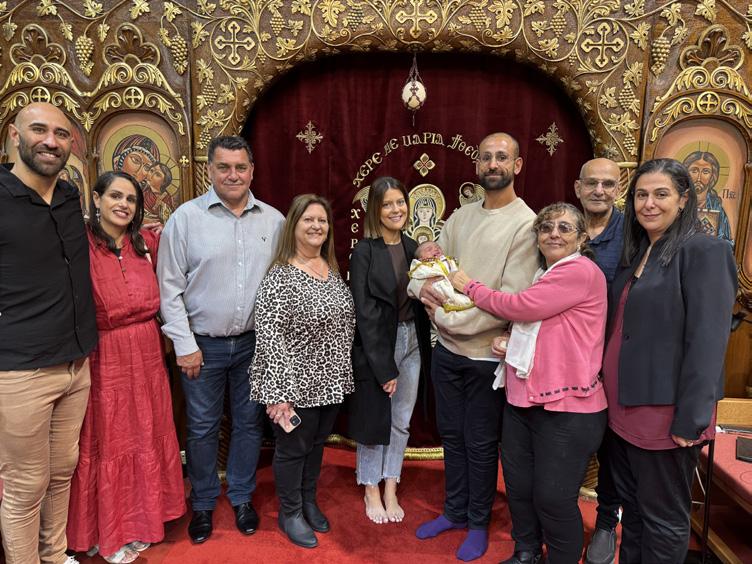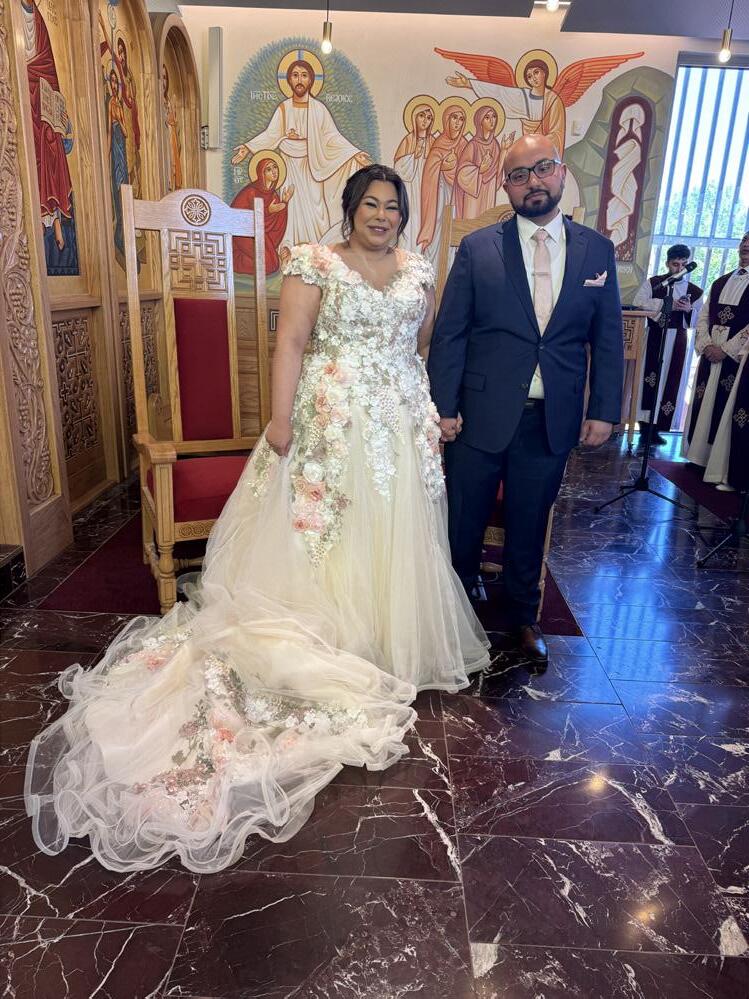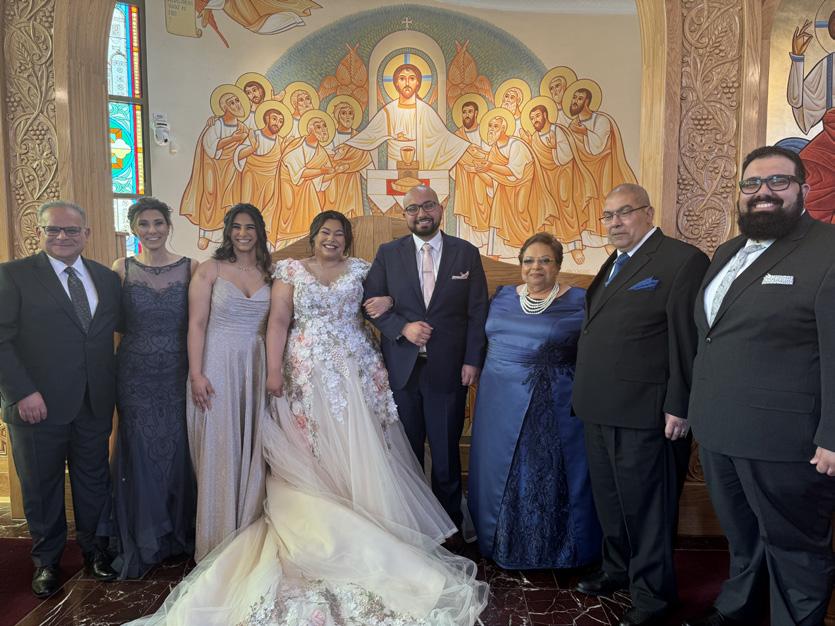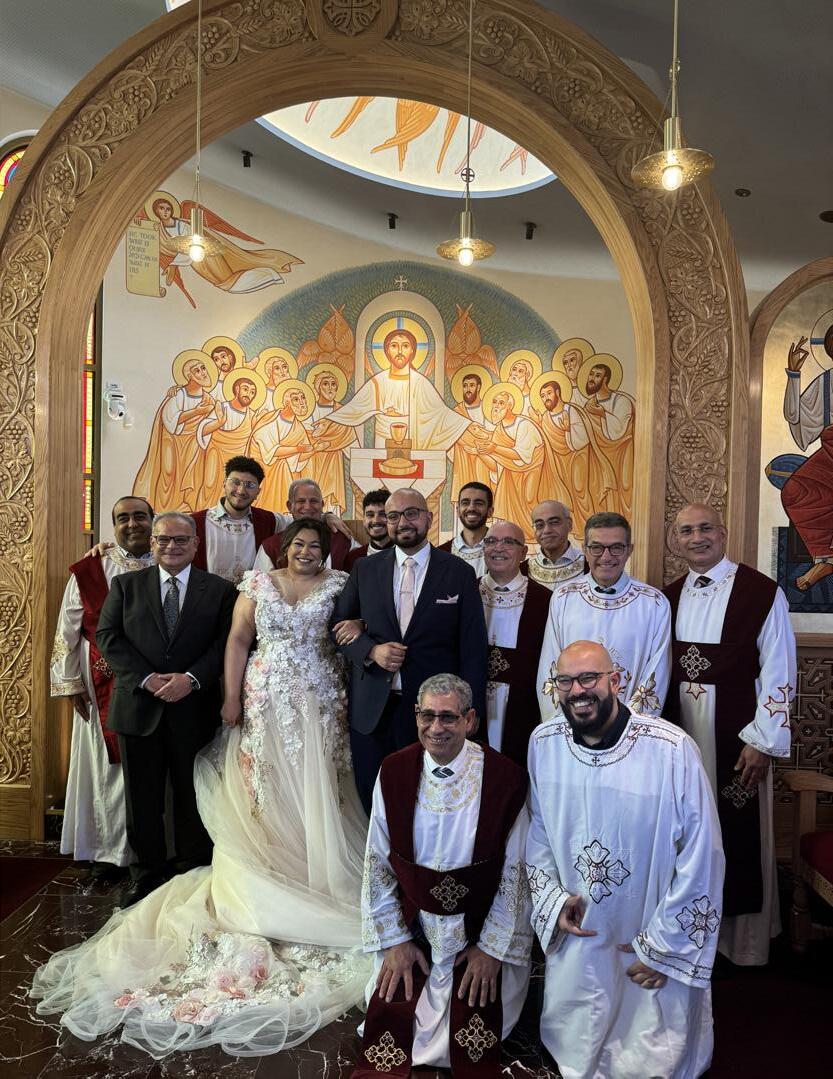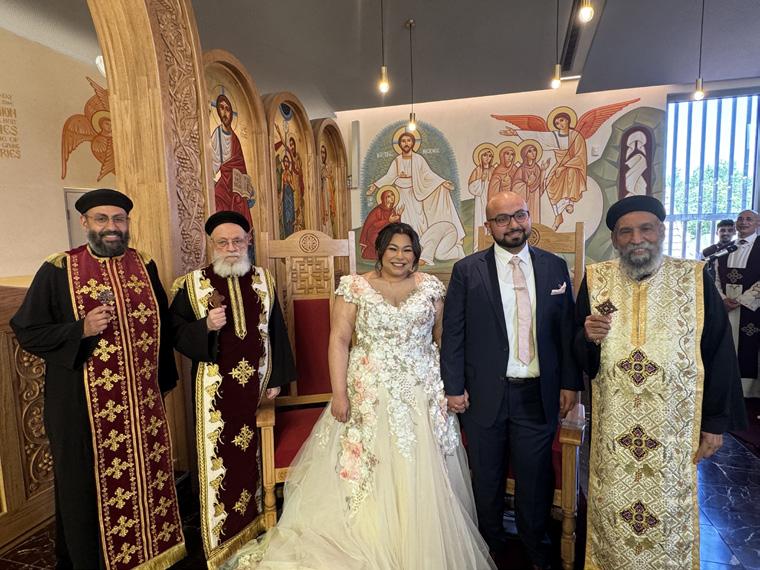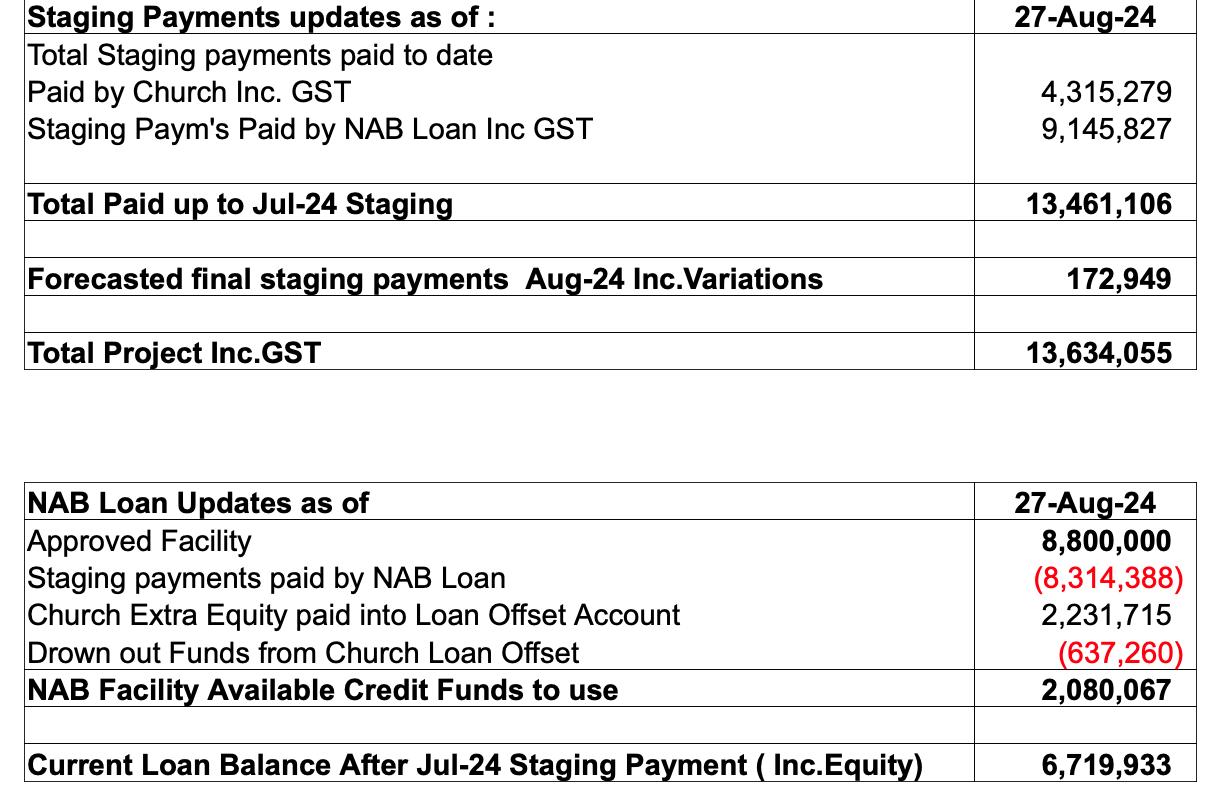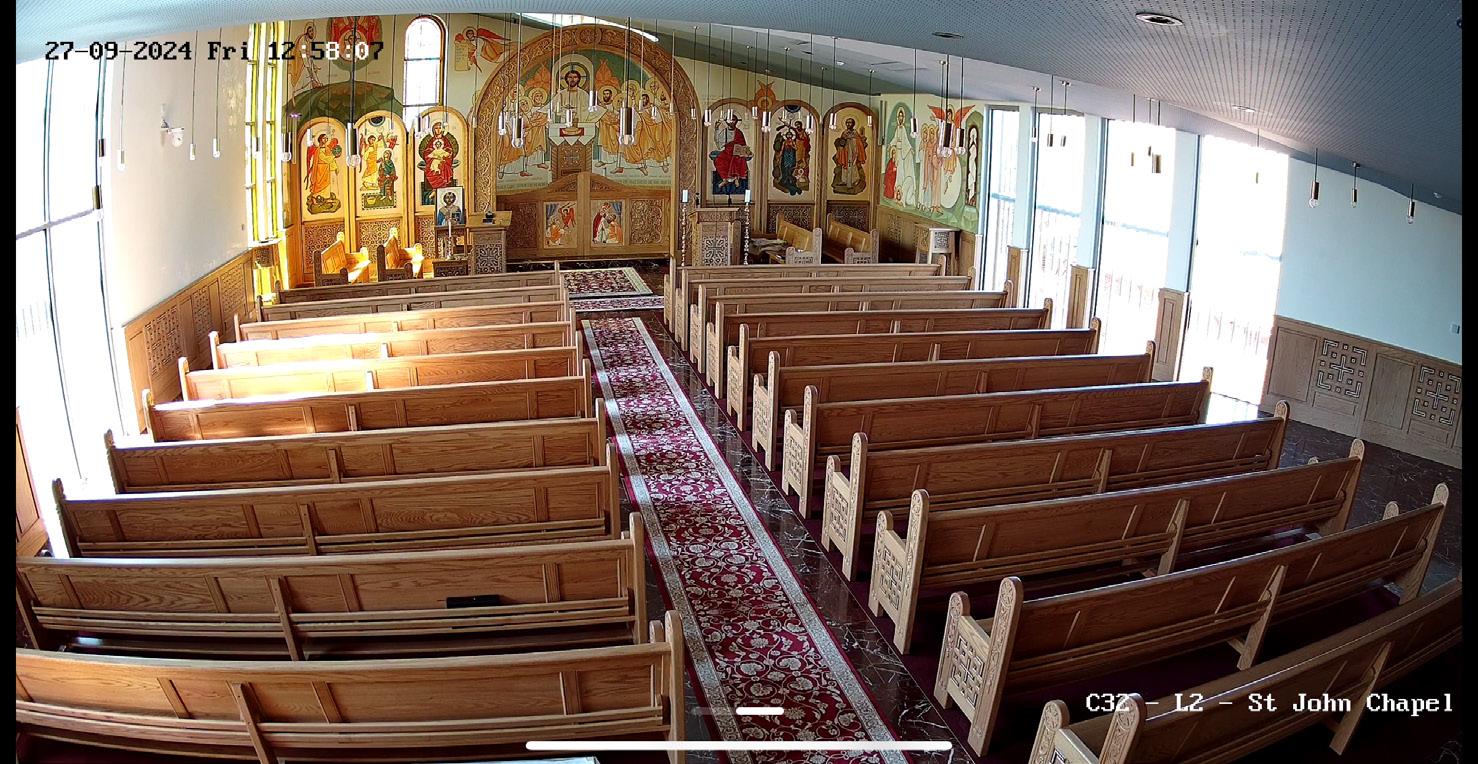
Services at St Mary’s Church
Monday:
Mass 9 - 11 am
Tuesday
Liturgy 5:30 - 7am
7:30pm The Way Orthodox Fellowship in Englisg for adults - All ages
Wednesday: Mass 9 – 11 am
6:30-8pm School of Deacons Adults
Thursday
Mass 9 - 11 am - English
English Midnight Praises 7:30pm
English Bible Study 7:30pm
Friday: Mass Mass 9 – 11 am
Youth 25 and above 7-9pm
Discipleship Clas Class 7-8:30pm
Saturday: Mass: 8:30 – 11am
Sunday School 4 – 5.30pm
Vespers & youth meeting 7-8:30pm English
Vespers &Bible Study Arabic 5:30-7pm
Scouts 1:30 - 3pm
School of Deaconsgip 3 - 4pm
Sunday:
1st Mass 6:30 - 8:30 Arabic & English
2nd Mass.8:30 - 10:30 English - St Mary’s
Church
3rd Mass 8:30 - 10:30 Arabic - St John’s
Chrysostom Church
Family Meeting fortnightly 11:30am
Hymns Class - English 11:45 - 12:30pm
Church Priests:
Fr Tadros Sharobeam 0414251251
Email: frtadros@me.com
Fr Habib Girgis Younan: 0401238177 – 94498871
Email: habibgirgisyounan@hotmail.com
Fr Michael Salib: 0422431821
Email: frmichael@sac.edu.au
Church Address: 5 Epsom Rd., Kensington Vic 3031 Tel: 93766651
Fr Kerillos Tawadros 0411 518 399
Fr John Makary 0433 445 636
The Departure of the Great St. John Colobos (the Short( 30th October - 20th Baba
On this day, the great light and saint, the hegumen Abba John (Yoannis( Colobos (the Short(, departed. He was a native of Betsa in upper Egypt and he had one brother. His parents were righteous and God-fearing people, rich in faith and good deeds. When he was 8 years old, his heart turned away from the futility of this world, its lusts and its glory, and he desired the monastic life. The grace of God moved him to go to the desert of Scete and there he came upon a tried and holy man whose name was Abba Pemwah from El-Bahnasa. John asked Abba Pemwah to allow him to stay with him. The old man answered, trying him, “My son, you cannot stay with us for this is a very hard desert and those who dwell in it eat from the work of their hands, besides observing many fasts, prayers, and sleeping on the floor and many other forms of asceticism. Go back to the world and live in the fear of God.” Abba John told him, “Do not send me away, for God’s sake, because I came to be in your obedience and prayers. If you accept me, I believe that God will make your heart well-pleased with me.” Abba Pemwah was in the habit of not doing anything hastily. He asked the Lord Christ to reveal to him the matter of this young man. The angel of the Lord appeared to him and said, “Accept him, for he shall become a chosen vessel.” Abba Pemwah brought him and he shaved the hair of his head. He laid out the garb of the monk, and he prayed over it for three days and three nights and when he put the garb on him, he saw an angel making the sign of the Cross over it. Saint John started his monastic life with great asceticism and splendid works. One day Abba Pemwah wanted to test him, so he expelled him from his cell saying, “I cannot live with you.” Abba John stayed out by the door of his cell for seven days. Every day Abba Pemwah went out and smote him with a palm branch and Abba John bowed down before him saying, “I have sinned.” On the seventh day, the old man went out to go to the church and he saw seven angels with seven crowns placing them on the head of Abba John. Since that day, he was held by him in honor and reverence. One day Abba Pemwah found a piece of dry wood and gave it to Abba John and said to him, “Take this wood, plant and water it.” St. John obeyed and went on watering it twice a day even though the water was about 12 miles from where they lived. After three years, that piece of wood sprouted and grew into a fruitful tree. Abba Pemwah took some of that fruit and went around to all the elder monks saying, “Take, eat from the fruit of obedience.” This tree still exists in its place in his monastery. Abba Pemwah fell sick for 12 years and Abba John ministered unto him all this time during which he never heard from his teacher that he fell short in his service. Abba Pemwah was an experienced old man who had been tried
much, and sickness had emaciated him until he became like a piece of dry wood, so that he would be a chosen offering.
When Abba Pemwah was about to die, he gathered together the elder monks and he held the hand of Abba John and gave him to them saying, “Take him and keep him, for he is an angel, not a man.” He commanded Abba John to stay in the place where he had planted the tree. After that Abba John’s older brother came to the monastery and was ordained a monk with him. He also became an honorable monk.
It happened when the father the Patriarch Abba Theophilus was ordaining Abba John hegumen and abbot over his church, and as he placed his hand over his head, a voice from heaven was heard by the people present saying, “Axios, Axios, Axios (That is to say he is worthy(.” When this saint consecrated the offering, he was able to know those who were worthy to partake of it and those who were not worthy.
Abba Theophilus the Patriarch built a church for the Three Young Men in Alexandria, and he wished to bring their bodies and place them in it. He brought Abba John and asked him to travel to Babylon, and to bring the holy bodies. After much forebearing, Abba John accepted to go on this mission. When he left the Patriarch, a cloud carried him away to Babylon. He entered the city and saw its monuments, rivers, and palaces and found the bodies of the saints. When he started moving them from their place, a voice came out from the holy bodies and said to him, “This is the Will of God that we do not leave this place until the day of the Resurrection. Nevertheless, because of the love of Abba Theophilus the Patriarch, and your labor, too, you should inform the Patriarch to gather the people in the church and to put oil in the lamps without lighting them and we will appear in the church and a sign will be made manifest to you.”
Then Abba John left and went back to Alexandria and told the Patriarch what the saints had said. It happened when the Patriarch and the people were in the church, the lamps were lit up suddenly and they all glorified the Lord. One day, a monk came into the cell of Abba John. He found him lying down with angels waving their wings over him.
Later on, the Berbers attacked the desert of Scete and he left it. When he was asked why he left, he replied that he did not leave because he was afraid of death, but because he feared a Berber would slay him and go to hell, for though he is against his worship, he is his brother in form. Then he went to the mountain of Abba Anthony on the Red Sea. There he dwelt by the side of a village and God sent him a believer who served him.
When the Lord wished to grant him rest and to end his strife in this world, He sent him His two righteous saints Abba Macarius and Abba Anthony to comfort him and
to inform him about his departure. On the eve of Sunday, he fell sick and sent his attendant to bring him something from the village. The angels and the host of saints came and received his pure soul and took it up to heaven.
At that time, his servant came back and saw the soul of the saint surrounded by the host of saints and angels singing before them. Before them all, there was one shining like the sun and singing. The servant marvelled at this magnificent sight. An angel came to him and told him the name of each one of the saints. Then the servant asked the angel, “Who is this one in front of them all, who is shining like the sun?”
The angel replied, “This is Abba Anthony, the father of all the monks.”
When the servant went into the cell, he found the body of the saint kneeling to the ground, as he had given up his soul while kneeling. The attendant wept sorrowfully over him and went in a hurry to the people of the village and told them what had happened. They came and carried his holy body with great honor. When they brought him into the village, great wonders and miracles were performed through his body.
His prayers be with us and Glory be to our God, forever. Amen.
The Departure of St. Freig (Abba Tegi, Anba Roweiss(. 31st October – 21st Baba
On this day also in the year 145 A.D. (1121 of martyrs( St. Freig, who is known as Abba Roweiss, departed. This saint was from a village called Miniet-Yamin (about 130 kilometers north of Cairo(. His father’s name was Isaac and his mother’s name was Sarah. When he was born, they called him Freig. He worked with his father in farming and he had a small camel on which he carried salt and sold it. He called the camel “Roweiss” (i.e. small head(. The camel used to put his head against his cheek as if he was kissing him. Because of his humility, he called himself after his camel.
Persecutions befell the Christians, so he came to Cairo and not having a house or shelter, he went from one place to another. He spent most of his nights in prayers and wailing. He did not own a coat or any clothes or a cover for his head. He was naked except for that with which he covered his loins, and his head was uncovered. He looked like the hermits of the desert; his eyes were red because of much weeping and he never cut the hair of his head. He was a man of few words -once an evil man smote him severely, but he did not open his mouth. St. Marcus El-Antoni was present at that time and he rebuked the evil man. During the later part of his life, he used to say, “O Virgin, take me because my burden is heavy.” He meant the burden of carrying the sin of the people for which he often rebuked them though they did not listen to him. He lived in the days of the holy father Pope Mattheos, 87th Patriarch, and St. Marcus El-Antoni, in the days of El-Sultan El-Zaher Barkuk.
He shut himself up in a small storeroom at the place of his
disciple Michael the builder, in Meniet Syreg. He stayed in that place for 9 years until his departure on the twenty-first of Babah of the year 1121 of the martyrs. He was buried in the church of the Virgin, in Deir El-Khandaq. He performed many wonders such as healing the sick, prophesying and saving many from their troubles.
His prayers be with us and Glory be to our God, forever. Amen.
His prayers be with us. Amen.
The Martyrdom of Saint Luke the Evangelist 1st November - 22nd Baba
On this day, St. Luke the Evangelist and physician, was martyred. He was one of the 70 disciples mentioned in the tenth chapter of his gospel. He accompanied the Apostles Peter and Paul and wrote their account.
After the martyrdom of these two Apostles, he went through Rome preaching. Those who worshipped idols and the Jews in Rome agreed among themselves and went to Nero the Emperor accusing St. Luke of attracting many men to his teaching with his sorcery. Nero commanded that St. Luke be brought before him. When St. Luke knew that, he gave all the books he had to a fisherman and told him, “Take these and keep them for they will be useful to you and will show you God’s way.”
When St. Luke came before Nero the Emperor, the Emperor asked him, “How long will you lead the people astray?” St. Luke replied, “I am not a magician, but I am an Apostle of the Lord Jesus Christ, the Son of the Living God.” The Emperor commanded his men to cut off his right hand saying, “Cut off this hand which wrote the books.” The saint replied to him, “We do not fear death, nor the departure from this world, and to realize the power of my Master.” He took up his severed hand and made it reattach to its proper place, then he separated it. Those who were present marvelled and the head of the Emperor’s cabinet and his wife believed as well as many others and it was said that they numbered 276. The Emperor wrote their decree and ordered that their heads be cut off together with that of the Apostle St. Luke; thus their martyrdom was completed. They placed the body of the saint in a hair sack and cast it in the sea. By God’s will, the waves of the sea brought it to an island. A believer found it, took it and buried it with great honor. This saint wrote the Gospel bearing his name and the “Acts of the Apostles” addressing his words to his disciple Theophilus who was a gentile. His blessings be upon us and Glory be to our God, forever
Comtemplation on the Gospel of Third Sunday of Baba
Matthew 12: 22 - 37
Commentray on the Gospel of St Matthew - Fr Tadros Yacoub - Conquering the Devil
St. Augustine comments on this chapter about:
Firstly: Christ is not Beelzebub the heard of the demons. Secondly: It is Satan’s kingdom and not the church that is divided against itself.
Thirdly: Is there any man who did not blaspheme the Holy Spirit?
Fourthly: was blasphemy meant to be a general one or a special one?
Fifthly: What special meaning did the Lord mean by blasphemy?
Sixthly: The surrounding circumstances in which the Lord spoke those words.
Firstly: Christ is not Beelzebub:
St. Augustine says: “For the Pharisees not the assume that Christ is the ruler of the devils, getting out devils, they have to listen to what he said (Matt 12:27( “And if I cast out demons by Beelzebub, by whom do your sons cast them out? Therefore they shall be your judges.”
Undoubtedly, by them he means his disciples, those who are sons of these people. It is absolutely certain they have learnt nothing of the satanic art from their good Master, so they could overpower the demons. This is why he said to them ‘they will be your judges.’ They are loyal, and of the poorest category, and know no envy, but they are rather described as having my sanctifies strength. They are witnesses to me and judges to you. This is why he added “But if I cast out demons by the Spirit of God, surely the kingdom of God has come upon you.” If I with God’s Spirit, cast out demons, then it is your children, whom I have taught nothing deceiving, but rather only the simplicity of faith, cast out demons…this is why the kingdom of God will come upon you, and the kingdom of Satan will perish, and you as well along with it.” By his saying, “By whom do your sons cast them out?” he manifests they do this according to his graces, and not as they deserve. This is why he says (Matt 12:29( “Or how can one enter a strong man’s house and plunder his goods, unless he first binds the strong man? And then he will plunder his house.”
Therefore, your sons who believed in him, and those who will believe in him, will cast out demons by the simplicity of holiness and not by power of Beelzebub. For real, they were as evil and as sinful as you are. They were in Satan’s house and a vessel for him; so how could they be saved from him? For it is he who tied them with darkness and overruled then, if the Lord had not tied him with the chains of his justice and has taken from him the vassal which was for scorn and degradation, and he made it for mercy? This is exactly what the devout apostle said when he rebuked those who relied on their own righteousness, saying, (1 Cor 4:7( “For who makes you differ from another?” That is to say, who will differ you from the eternal destruction that you inherited from Adam? Or who will change you from being a scornful and degraded vessel? No one is able to
answer that in his self-righteousness he is changed from being a vessel of degradation. The apostle adds (Eph 2:3( “What other thing do you have, which you did not take?… and were by nature children of wrath, just as the others.” For he was a persecutor of the church, he was resistant and envious and he blasphemed. He was a vessel in the house of this strong evil one. But Christ, who tied this strong devil, took the damned vessel and made it his chosen one. In this way the Lord Jesus confirms it is not by Beelzebub the ruler of the demons, that he casts out demons. But he is the only Son of God who works by his Holy Spirit. The sign for this is apparent in the life of the simple disciples who lived among them, and they realize their entire past life. Now, they carry power and authority, which confirms the manifestation of God’s kingdom.” The Lord says “but if I cast out demons by the spirit of god, surely the kingdom of God has come upon you.” The Lord has appeared among us, crushing down Satan’s kingdom and establishing God’s spiritual kingdom. He performed and fulfilled his authority on our account, for all of us, and he granted it to his disciples, so God’s kingdom would be declared in all the nations.
Pope Cyril the great says, “He said well ‘the kingdom of God has come upon you’; this means that since I have become man as you are, and cat out demons by God’s Spirit, by this humanity had become enriched in me from the kingdom of heaven. It has attained glory by casting out demons, and rebuking the evil spirits.” St. Ambrosios also says, “He had manifested by doing so, the existence of the royal authority of the Holy Spirti, which is God’s finger. We too, since the Holy Spirit dwells in us, we have become a royal dwelling. This is why he says on another occasion (Luke 17:21( “The kingdom of heaven is in you.””
Secondly: The Demon’s kingdom, and not the Church, is the one divided against itself:
St. Augustine says, that Christ’s church represents God’s indivisible kingdom; it is the Catholic Church. But as for the heretics who carry Christ’s name, and are separated from the church, these do not belong to God’s kingdom. Their presence does not mean a division has happened in Christ’s body. They just have the name but not the membership.
Indeed, any division whatsoever, be it on the level of the Catholic Church or the local one, or the church of the house, or inside the believer’s heart, is all foreign to Christ’s Spirit.
Man loses his true membership in the Only Begotten Christ’s body. It is the work of Satan!
Thirdly: The adversary makes the most of the Lord’s words concerning the unforgiveness of blasphemy against the Holy spirit, so he may crush down some souls. He makes them doubt they have thought of blasphemy against the spirits, so as to shut down the door of hope for salvation. St. Augustine suffered as a bishop regarding this point amongst his people. He wished to invoke in them the
Spirit of hope, and thereby destroying all Satan’s doubtful attempts.
He began by assuring us that each person is liable to have thoughts of blasphemy, whether it be by uttering a word of blasphemy particularly before his faith. Will salvation door be shut down before all?
St. Augustine says, “Who is he who has not sinned with a word against the Holy Spirit before becoming a Christian, or before becoming a follower to the Catholic Church?”
1( The atheists: These worship many other false gods, and kneel down before statues, and say the Lord Jesus performed his miracles by the power of magic. They are like those who said by the power of demons he casts out demons. They blaspheme against our holies every day. Is not this blasphemy against the Holy Spirit?
2( The Jews: Do not the Jews by uttering these words; have urged the discussion I am talking now? Do not they repeat, up till today, the blasphemous words against the Holy Spirit, by denying his presence in Christians?
The Sadducees have denied the Holy Spirit; but the Pharisees have not denied him, and they rather confirmed his presence. But they denied his relationship to the Lord Jesus Christ, for they considered him the ruler of demons, casting out demons, even though he cast them out by the Holy Spirit.
3( The Heretics: The Jews as well as the heretics who believe in the presence of the Holy Spirit, deny his relationship to Christ’s body, that is the one and only Catholic Church. These undoubtedly are as the Pharisees who despite their confessing the presence of the Holy Spirit, yet they denied his presence in the Lord Jesus. They attributed the casting out of demons as his being the ruler of demons.
It has become clear that the atheists, the Jews and the heretics have all blasphemed against the Holy Spirit. Should these be disregarded, and lose the hope according to the words, “but whoever speaks against the Holy Spirit, it will not be forgiven him, either in this age or in the age to come.” Is it possible not to have any blasphemy against the Holy Spirit except it be by the Christian who has been raised up since his Childhood in the Catholic Church? Indeed, all those who believed in God’s Word, and have followed the Catholic Church, whether they be atheists, Jews or heretics, have obtained the grace and peace of Christ. If they have not obtained the grace and peace of Christ. If they had not obtained the forgiveness for the words they uttered against the Holy Spirit then our promise for them, and our preaching of returning the God to obtain peace and the forgiveness of sins…. All this would have been considered fake and false. The words did not say ‘It will not be forgiven except by the baptism’, but he rather said ‘will not be forgiven in this age or in the age to come.’
4( The Christians: Some may think the Holy Spirit is not sinned against except by those who were washed in the water of the new birth. This sin of theirs is because of their ingratitude to the greatest gift that the Savior has granted
them with. They threw themselves, after being given the gift, in the perishing sins such as adultery, killing, departing from Christianity or from the Catholic Church. But how can we prove the authenticity of this? I cannot say so, because the church will not reject the repentance for any kind of iniquity. St. Paul the apostle says it is possible to rebuke the heretics, that is to say the Christians who have gone astray, for obtaining the reentrancy “I wish God would give them the repentance to know the truth, so they would wake up from Satan’s ambush, for he has then in his grip (2 Tim 2:25,26( of what use is their correction if they have no hope in attaining repentance? Likewise the Lord did not say ‘The baptized Christian who says a word against the Holy Spirit’, He rather said ‘But as for him who says a word … that is, he who says a word, whether he be an atheist, or a Jew, or a Christian or a heretic.’”
Fourthly: By ‘blasphemy’, does he mean the general or specific meaning?
St. Augustine had confirmed that the doors of God’s mercies are open to all, even to those exposed to blasphemy against the Holy Spirit, whether it be before the faith in Jesus Christ, by the Jews or Gentiles, or even after the faith such as when falling into heresy against the Holy Spirit, or by committing bitter evil iniquity. He began to make clear the words of Jesus Christ about ‘the blasphemy against the Holy Spirit.’ This is in the statement just mentioned, that he did not mean the general meaning, which is every blasphemy against the Spirit, he rather meant a specific implication.
St. Augustine says, “The Lord did not say ‘every blasphemy against the spirit will not be forgiven’ or he who says any word”, but he said ‘but as for him who says a word.’ So, if you mention the word ‘every’, the church would not have been able to emlerace sinners, evil ones, and those who resist, so as to give them Christ and the holies of the church. They could be Jewish, Gentiles, atheists or heretics, or even those weak Christians who belong to the Catholic church itself. God forbid this would be his meaning! I say, God forbid he says ‘every’ or ‘any’ blasphemy against the Holy Spirit has no forgiveness. So, undoubtedly, there are blasphemies and certain words, that, if said about the Holy Spirit, these have no forgiveness. What is this word then? This is God’s will, to ask this question, so he reveals it to us; it is his will that we ask him, and not to protest his words. The Holy Book mostly uses this method: to express a certain issue, with no specification if it is of a general or personal meaning. By so doing, this is no urgency to understand it in the general or personal sense. For, he does not use the world ‘all’ or ‘some’. He does not speak in a general or personal method.


